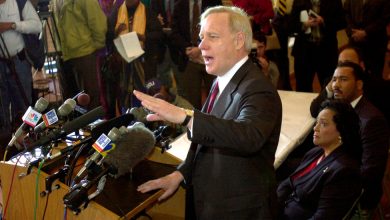
Defending Free Speech Is Not ‘Moral Relativism’
On Dec. 14, a Christian veteran named Michael Cassidy walked into the Iowa State Capitol and destroyed a display erected by the Satanic Temple of Iowa. The display was an idol of Baphomet, a robed figure with a goat head. Cassidy told Fox News host Jesse Watters that he had destroyed the statue in an act of “Christian civil disobedience.”
By itself, Cassidy’s action wasn’t remarkable or unusual. It was simply one more act of ideologically or religiously motivated vandalism against constitutionally protected speech. In recent months we’ve seen pro-Palestinian activists rip down posters of Israeli hostages, for example, in a manner that is both similarly outrageous and, depending on the circumstances, similarly illegal. The legal principle is simple: My right to speak does not include a right to destroy another person’s speech.
There is little doubt that the Satanic Temple’s display is constitutionally protected. Supreme Court jurisprudence prohibits state governments from privileging one religion over another in access to state facilities. Given that the Iowa State Capitol had allowed other groups to set up religious displays, they were required by law to let the Satanic Temple set one up too — indeed, the temple explained it had placed the statue as a symbol of their right to religious freedom. It’s easy not to take the Satanists seriously — the temple doesn’t even really believe in Satan, calling him a “mythological framework” — but the free-speech principle here is no joke.
None of this is radical or new. It’s been settled constitutional law for decades. You don’t have a true free speech regime if the law doesn’t protect the speech of ideological or religious minorities.
But the right-wing response to the Baphomet vandalism was notable, and a further sign of the right’s decaying commitment to freedom of expression. Florida’s governor, Ron DeSantis, tweeted, “Satan has no place in our society and should not be recognized as a ‘religion’ by the federal government. I’ll chip in to contribute to this veteran’s legal defense fund. Good prevails over evil — that’s the American spirit.” The Turning Point USA co-founder Charlie Kirk said, “A Christian veteran just beheaded a monument to Satan in Iowa’s State Capitol. If this is Christian Nationalism, we need more of it. Hero.”
(Not everyone on the right believed the statue should be destroyed. The Iowa governor, Kim Reynolds, articulated the constitutionally sound view that “In a free society, the best response to objectionable speech is more speech, and I encourage all those of faith to join me today in praying over the Capitol and recognizing the Nativity scene that will be on display.”)
What is happening? Why are leading figures on the right embracing the exact kind of behavior they condemn on campus? Why is it that campus activists are “snowflakes” when they tear down conservative displays, but a Christian veteran is a “hero” who embodies the “American spirit” when he engages in comparable ideological vandalism?
To understand the moment, one has to understand the extent to which many religious activists believe that free speech itself is responsible for America’s ongoing secularization and alleged moral decline. They believe the doctrine of viewpoint neutrality — that is, the requirement that the government treat private speakers equally in their access to government facilities — is a proxy for “moral relativism.” Moral relativism is a truly poisonous accusation in conservative and Christian communities, in part because it implies a rejection of immutable or universal truth in favor of a subjective, individual standard — a concept alien, for example, to traditional Christianity.
As a free speech advocate, I’ve been fending off the “moral relativism” accusation for years. In 2019, when I wrote in support of the right of drag queens to enjoy the same access to public facilities as anyone else, that was “moral relativism.” When I wrote earlier this month that the right of free speech includes even the right to calls for non-imminent violence — again, this is a matter of settled constitutional law — a scholar named John Grondelski wrote in a Catholic journal that my position was “the offspring of the dictatorship of relativism.”
This claim is a Christianized cousin of the secular idea that defending the free-speech rights of those with whom you vehemently disagree is, in essence, providing aid and comfort to racism, sexism, homophobia or transphobia. In this view, your role as a citizen is first to determine whether any given speech meets with your moral approval, and then — and only then — to rally to its defense.
But this is dangerous nonsense. I’m the farthest thing from a relativist. Indeed, my evangelical Christian religious convictions place me in a cohort that includes a mere 6 percent of adult Americans who hold a set of decidedly non-relativistic beliefs, including about the divinity of Christ and the authority of scripture. I’m fully aware that if the terms of debate in America were based on a religious or moral consensus, my viewpoint would be immediately chased from the public square. And in fact, much of my legal career was dedicated to protecting minority religious expression — including evangelical expression — from censorship on American campuses and in American communities. In the course of that representation, I learned three practical truths of free expression.
First, few people are more eager to take advantage of free speech rights than people who possess deep moral convictions. When you watch a furious campus debate, the last thing you think is, “Watch the relativists fight.” The combatants possess burning convictions about, say, the Gaza war, or race and justice in America or L.G.B.T.Q. rights. When I stood with Christians, Muslims, and Jews who faced exclusion and persecution, never once was I representing a relativist. These people believed in their core values so much that they refused to be silent.
Second, humility isn’t relativism, and even people who believe that absolute truth exists should possess enough humility to recognize they don’t know all that truth. I’ve been an evangelical my entire life, but my faith certainly hasn’t insulated me from error. I’ve made mistakes. I’ve been wrong. And, by the way, I haven’t learned from Christians alone. I’ve been profoundly influenced by people from virtually every ideological and religious background. I’m a better person for my relationships with people with whom I disagree. Imagine the arrogance of thinking that my tribe or my sect — which is inevitably chock-full of fallen, imperfect people — should be the arbiter of truth, much less liberty.
Third, prudent people know that they will not always rule. This is the most pragmatic case for free speech. In a democratic society, no party or movement possesses permanent power, and when you limit the liberty of your foes, you give them the power to limit your liberty the instant you lose an election. An immense amount of censorship would evaporate overnight if angry activists truly imbibed the lesson that the standard they seek to impose on others can also be inflicted on themselves.
Every conservative who cheers, for example, Ron DeSantis’s aggressive and unconstitutional war on the “woke” would regret the eradication of viewpoint neutrality as soon as a newly empowered Democratic government started to wield the same weapons of censorship and discrimination against them.
One of my favorite expressions of American pluralism comes from my friend Barry Corey, president of Biola University, an evangelical college in California. He advocates a life lived with a “firm center and soft edges.” The firm center is the “commitment to that which is true,” and for a Christian that means God’s truth. Soft edges, on the other hand, “means hospitality and kindness, especially toward those we don’t think like, or vote like, or believe like.”
American free speech doctrine represents a legal version of that marvelous moral rule. The First Amendment protects our firm center. It’s what ensures our ability to walk into the public square, express our convictions and challenge our nation’s moral and political norms. Does anyone for a moment think that Frederick Douglass, the great abolitionist, was a moral relativist? Yet he’s also the author of one of the most powerful arguments in support of free speech in American history.
At the same time, we protect the free speech of others and thereby manifest “hospitality and kindness.” We declare to our opponents that they are equal citizens of our Republic, possessing the same dignity and liberty that we possess ourselves.
That’s the key to making pluralism work. Enforced conformity is a recipe for violent conflict, regardless of whether the demand is made from the right, left or middle. The defense of liberty, meanwhile, makes diversity sustainable. It allows individuals and communities of differing convictions to flourish across those differences. Treating them all equally under the law isn’t relativism. It’s justice, and justice is a fundamental moral obligation of the state.




